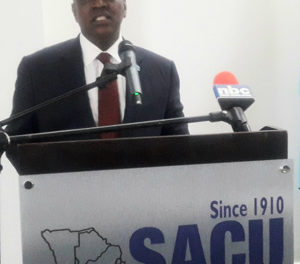
Billions won’t address unemployment
Namibia is not only failing to create new jobs, but existing jobs are being reduced. Therefore policy interventions aimed at reducing unemployment, should be implemented together with other complementary measures, says Martin Mwinga, an independent economist.
In his report, Unemployment in Namibia: Measurement Problems, Causes & Policies which was released this week, Mwinga says unemployment policy interventions aimed at reducing unemployment and promoting employment growth, if undertaken in the absence of other complementary, economy-wide measures may prove to be unsustainable.
“Although the goal of growing new jobs over the coming years is achievable, it cannot be achieved with only a single policy instrument or by spending billions of dollars on projects. There is a need to design a package of interventions that addresses a range of challenges and problems in the economy and address the constraints to job creation.
“Unlike other countries in sub-Sahara Africa, Namibia has a well-functioning and well maintained infrastructure, a regulatory framework friendly to private sector investment and the country therefore needs to build on the strengths and successes of past policy interventions, and recognise the weaknesses and gaps and address these,” Mwinga added. He said that if Namibia should address the challenge of unemployment effectively, the country should ensure that data collected is adequate.
Mwinga said the unemployment and employment statistics based on the 2008 Namibian Labour Force Survey are inadequate for providing insight into the challenges in the labour market.
Mwinga emphasised that institutions mandated with the responsibility of collecting labour statistics must ensure that the data passes the test before being released.
“The current Namibia Labour Force Survey was designed to measure an economy in which formal and full-time work was the norm. Current employment rates, based on existing surveys, underestimates employment in the informal sector of the economy. In a labour market with high rates of unemployment and a large number of people working in the informal sector, a new method of collecting activities and employment in the informal sector of the economy is needed,” he said.
Mwinga also recommends that the country’s macro-economic policies be revisited and that economic reform that focuses on removing constraints that impede growth, be implemented.
“The primary responsibility for job creation lies with government, and there is therefore a need for an explicit, comprehensive road map in the form of a strategic plan to guide, coordinate, and direct efforts needed across different government institutions, different stakeholders such as international organisations, private sector, workers unions, civil society etc. Once a strategic plan on job creation is adopted, an employment creation action plan must be developed as a useful mechanism and delivering vehicle on the job creation strategic plan,” Mwinga suggested.
According to the 2008 NLFS, total employment declined from 43 3850 in 2000 to 33 3453.
“When segmenting between formal and informal employment, data shows that informal employment in Namibia has been contracting from 43% of total employment in 1993, declining to 33% and 16% of total employment in 1997 and 2008 respectively.
“Labour market data display some inexplicable large fluctuations, for instance employment figures in agriculture declined sharply by 49%, while fishing sector employment declined by 89% between 2004 and 2008. Unemployment policy and strategies based on current unemployment rate could fail to produce intended results, not because they are poorly designed but the policy failure could be due to poor data quality,” Mwinga further said.
He further recommends that in order to address labour market issues in a coordinated manner, there is a need to avoid duplication of efforts and competition among several ministries and institutions that have some employment or labour functions, and that a single ministry or government agency must be given the task with the responsibility for employment creation and harmonisation of labour market policies with government policies.
Mwinga first released preliminary findings of the Unemployment in Namibia: Measurement Problems, Causes & Policies report in November last year, when he estimated the unemployment rate to be at 28.4%. His findings were met with some scepticism and some suggested that the unemployment rate could even be as high as 55% instead of the official 52%.














































